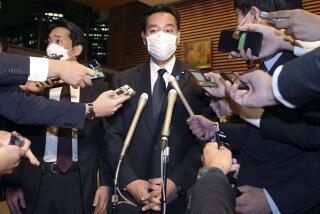Japan’s Premier Mori Is Not Totally Off Base
- Share via
Japan’s new prime minister, Yoshiro Mori--who has a reputation for verbal gaffes--has been accused of stirring dangerous religious sentiments by describing Japan as a “divine country with the emperor at its center.”
Opposition parties and religious groups immediately accused him of contradicting Japan’s postwar constitution, which specifically rejects the notion of imperial divinity and enshrines a strict separation of church and state. China, too, attacked Mori for reviving claims of imperial divinity that were used to justify Japan’s military aggression against Asia and, later, the United States during World War II.
It is true that Mori once again inartfully put his foot in his mouth. But his words ought to be carefully examined, for the knee-jerk reaction against touting the emperor may have been overwrought.
In apologizing for his comments, Mori told the parliament that he was not suggesting a return of state-sponsored Shintoism, a theocracy centered on the emperor, or an end to democracy. Reaffirming his belief in religious freedom, he told reporters that the phrase he used to describe Japan, “kami no kuni” (country of the gods), encompassed not only Shintoism, the religion of the emperor, but also the great Japanese Buddhist teachers Shinran and Nichiren. The concept of a country’s intrinsic spiritual fabric seems little different than proclamations of America as one nation under God.
Mori asserted that Japan “should take religion more seriously.” And there he made an important point.
Recent news stories out of Japan have sickened me: A 17-year-old boy hijacked a bus and killed a passenger with a knife. A 15-year-old boy was bullied by his classmates, who extorted $500,000 from him; a 16-year-old girl slashed the ear of a classmate. A recent survey showed that one out of every three high school students confessed that they wanted to beat up their parents.
The people have lost faith in their politicians, who show no sign of ending their corrupt legacies, and in self-centered bureaucrats. Even the fabled corporate loyalty of Japanese workers is cracking, as the prolonged economic recession prompts the abrupt layoffs of scores of middle-aged employees who have given their lives to their firms.
In the middle of this social, political and economic turmoil, the Japanese people desperately need a figure to respect, love and uphold as the nation’s moral beacon. The only authority figure with the remote possibility of filling that role is, in fact, the emperor.
Every New Year’s Day, millions of Japanese visit the Imperial Palace in Tokyo to greet the emperor and empress. When the imperial couple visited Kobe to comfort the victims of the devastating earthquake in 1995, their presence moved people to tears.
Even for Japanese living abroad, the emperor remains a symbol of deep comfort. When they brace up immigrants or war brides living abroad with their words of encouragement--”We fully understand your hardship. Please take care of yourself”--they unleash torrents of emotion.
Despite a checkered legacy, the imperial family is the only institution left in Japan today that still commands wide respect.
Even though Japan is a nominally religious country--84% of Japanese say they observe both Shintoism and Buddhism--the religious, moral and spiritual values that used to inform society have been drastically weakened. If the emperor can be used to represent and reawaken the values of harmony, compassion, consideration for others and nonviolence as a means of resolving disputes, he would serve a tremendously valuable role. Reading between the lines of Mori’s remarks, I can see the prime minister’s desire for the emperor to take more responsibility, in a nongovernmental role, to reform Japan morally--a longing I share.
There is one important precondition for the emperor before he can assume that task. He should be free to clear up, once and for all, the issue of his father’s responsibility for Japan’s war of aggression in Asia during World War II. In the name of the Emperor Hirohito (Showa), Japan’s military machine justified the killing of millions of people; yet the emperor was never made to answer for those actions. Until that cloudy legacy is resolved, the emperor can never be fully freed to fill Japan’s urgent need for a moral and spiritual authority.
More to Read
Sign up for Essential California
The most important California stories and recommendations in your inbox every morning.
You may occasionally receive promotional content from the Los Angeles Times.













